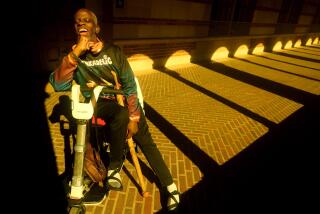Learning to manage with a disability
- Share via
UCLA’s management school has for years hosted executive training sessions for African Americans, women, Latinos, lesbians, bisexuals, gays and transgender people. This week, the school convened its first-ever workshop for disabled executives, filling what experts say is a void.
The five-day event closing today at the UCLA Anderson School of Management brought together disabled supervisors from a number of companies to hone their leadership skills, plot career goals and build support networks.
“This is kind of new territory,” said Peter Blanck, chairman of the Burton Blatt Institute, a disability research center at Syracuse University. “Most people with a disability have been historically out of sight and out of mind.”
Although many companies have made concerted efforts to recruit disabled workers in recent years, those employees often face a glass ceiling when it comes to advancement. Yet when people with a significant impairment are in positions of leadership, Blanck said, their presence makes the organization’s culture more tolerant.
The 25 workshop participants, all seasoned managers, came from companies that helped sponsor the workshop, including AT&T; Inc., Merck & Co., Google Inc., PepsiCo Inc. and Motorola Inc.
The participants each had different kinds of disabilities but the leadership skills they were learning could be used almost anywhere, said Patty O’Sullivan, a human resource manager at Agilent Technologies Inc. in Santa Clara, Calif., and one of the participants.
O’Sullivan attended an Anderson School seminar for female executives six years ago but believed that she didn’t bond with the other women. The goal was “to teach women to speak powerfully,” she said, “but as a deaf person, it didn’t fit me.”
Her feedback led Anderson’s administrators to organize the program for disabled executives.
“This week the void will be filled,” O’Sullivan said.
Role models and mentors are important for every manager, said Laurie Dowling, who directs Anderson’s executive education programs. But disabled employees, like those in other underrepresented groups, may not have bosses or sponsors who can sing their praises and help them take advantage of opportunities often filled through word of mouth, she said.
“The people who’ve gone before us can often give us important advice about how to handle challenges, and they are the people who can help teach us how to blow our horns,” Dowling said.
Robert David Hall, who gave the workshop’s keynote address Tuesday night, has used his celebrity status as a regular on CBS’ hit TV show “CSI: Crime Scene Investigation” to make that point. Hall, who plays coroner Dr. Albert Robbins on the show, lost both legs in 1978 when he was hit by a drunk driver.
“I passionately believe that people with disabilities are undervalued and underutilized,” he told the group.
Dr. Robbins rarely mentions his disability, Hall said. “The significance of my character is that he’s very good at his job.”
“Images have enormous power,” he said. “If we see people with disabilities portraying strong characters on TV and in the movies, there will be a positive result.”
David Foster expects to use the skills he learned this week to help other disabled employees at Northrop Grumman Corp. as well as to advance his 17-year career with the aerospace company. The 44-year-old engineering manager, who supervises 70 employees at Northrop’s electronics facility in Maryland, has multiple sclerosis that requires him to use crutches.
So far, Foster said, his disease has caused only limited difficulties for him at work. But he believes that the sessions on personal development, productivity skills and dealing with stereotypes are teaching him tools that will help maintain his performance should his health decline.
--






